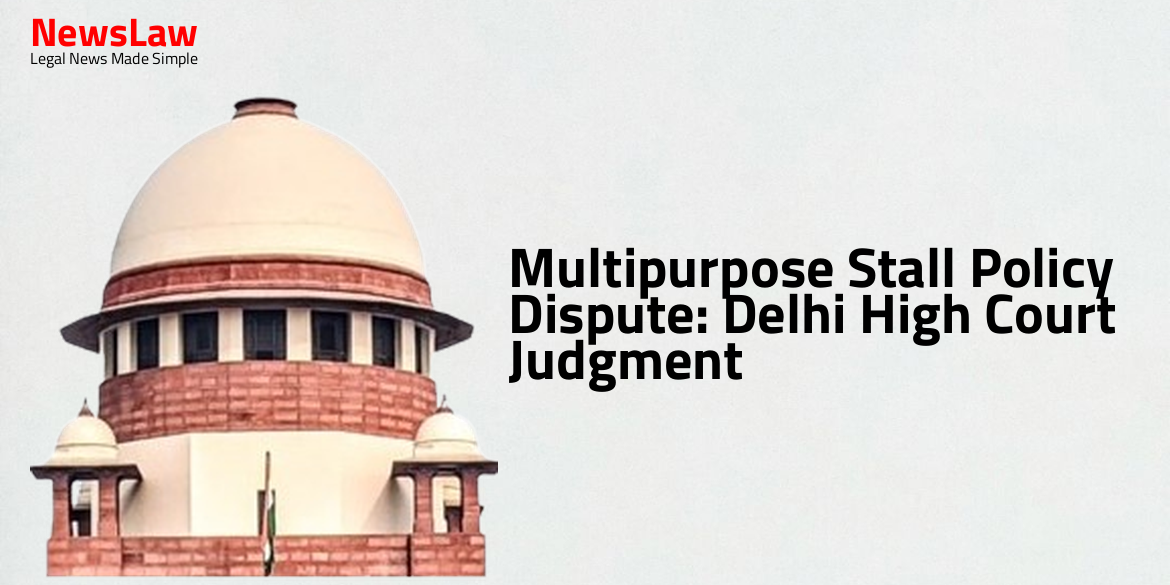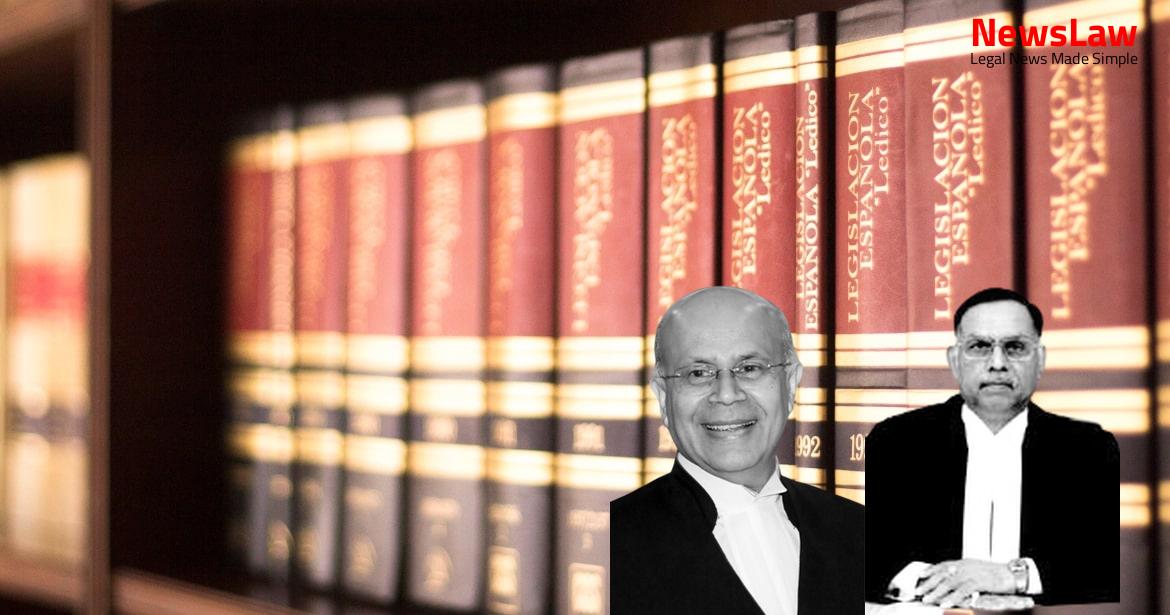Explore the intricate legal analysis conducted by the court regarding the collection of cess under the Building and Other Construction Workers (BOCW) Act. The court’s detailed examination of the statutes and regulations governing cess collection sheds light on the importance of adhering to proper assessment and levy procedures. This summary focuses on the court’s legal insights and findings in the context of the BOCW Act.
Facts
- The UPPTCL filed a Special Leave Petition against the High Court’s Judgment setting aside the letters directing the remittance of Labour Cess by the Respondent No.1.
- The Labour Cess amounting to Rs. 2,60,68,814/- computed at 1% of the contract value was disputed under the Cess Act and BOCW Act.
- The BOCW Act aims to regulate the employment and conditions of service of building and construction workers for their safety, health, and welfare.
- The Act estimates about 8.5 million workers in the country engaged in building and construction works, highlighting the vulnerable nature of this labor force.
- Interest at the rate of 2% per month was chargeable on the Labour Cess.
- The Respondent No.1 sought the opinion of the Labour Commissioner on the applicability of Labour Cess on the cost of supply of equipment and materials, arguing against its payment.
Also Read: Electoral Malpractices in Mayor Election
Arguments
- Mr. Singh highlighted the separate Schedule of Payments for supply and delivery of equipment and materials.
- Total payment amount for supply and delivery was Rs.275,09,33,042.00, while the total contract value was Rs.302,06,08,217.00.
- The four contracts were considered as a single contract for timely execution responsibility.
- However, for all other purposes, including tax or fees, the supply contract was treated as separate and distinct.
- Mr. Singh argued that the terms and clauses of the contract clearly outlined that the first contract was solely for the supply and delivery of equipment and materials
- It was emphasized that the contract was a pure supply contract and was separate and distinct from any civil works contract
Also Read: Balancing Power and Transparency: Electoral Bonds Struck Down, Disclosure Mandated
Analysis
- The BOCW Act has been enacted for the welfare of building and other construction workers.
- UPPTCL cannot realize labour cess under the Cess Act without proper assessment and levy.
- UPPTCL has no authority to withhold dues for one contract based on another contract.
- The High Court found that recovery of cess without assessment under the Cess Act was unlawful.
- There are no provisions in the contracts allowing UPPTCL to withhold amounts for taxes or cess.
- The question of cess applicability in equipment supply was left open.
- The court found that certain contracts did not involve construction works amenable to cess.
- Deduction of Income Tax at source is distinct from realizing disputed cess.
- The existence of an arbitration clause does not bar court from entertaining a writ petition.
- UPPTCL changing stance post CAG report was noted.
- The Respondent No.1 had fulfilled its obligations in the first contract and all due payments were made.
- UPPTCL’s action of realizing cess solely on CAG report was deemed excessive without proper adjudication.
- The High Court restrained UPPTCL from encashing the bank guarantee in an interim order.
- Cess could only be recovered as per the stipulated procedures under the Cess Act and rules.
- The High Court set aside UPPTCL’s demand for outstanding labour cess based on unsustainable grounds.
- There was no arbitration agreement mentioned in UPPTCL’s counter affidavit in the High Court.
- UPPTCL’s attempt to enforce building cess solely on CAG report was deemed beyond its legal powers.
- The Court reiterated that relief under Article 226 can be granted even in contract-related cases.
- Monetary relief can be granted through a writ petition.
- The BOCW Act aims to provide welfare measures for building and other construction workers.
- The High Court found that UPPTCL had acted excessively without proper assessment or levy of cess under the Cess Act.
- Cess under the Cess Act is payable for the contracts involving civil works.
- UPPTCL had demanded and partially realized cess only based on the CAG report without proper procedure.
- The Contract in question was identified as a Supply Contract.
- UPPTCL actions were deemed beyond its powers without proper assessment or levy of cess under the Cess Act.
- The BOCW Act was enacted to levy cess on the cost of construction incurred by employers for welfare purposes.
- The Cess Act provides for the levy and collection of cess on the cost of construction for the Building and Other Construction Workers’ Welfare Boards.
- Section 3(1) of the Cess Act allows for the levy and collection of a cess not exceeding two per cent of the cost of construction by the Central Government.
- The definition of ‘Contractor’ under the BOCW Act includes a person who undertakes to produce a given result by employing building workers.
- The definition of ‘building worker’ under the BOCW Act includes persons employed in skilled, semiskilled or unskilled manual work in connection with construction.
- The Cess Rules dictate the manner in which the cess is collected from employers, including through deduction at source or advance collection through local authorities.
- The proceeds of the cess collected are to be paid to the Board after deducting the cost of collection, as specified in the Cess Act.
- In Arun Kumar Agrawal v. Union of India and Others (2013) 7 SCC 1, the Court held certain principles.
- Pathan Mohammed Suleman Rehmatkhan v. State of Gujarat and Others (2014) 4 SCC 156, established specific rulings.
- Dewan Chand Builders and Contractors vs Union of India (2012) 1 SCC 101, highlighted the objectives of the BOCW Act.
- Lanco Anpara Power Limited v. State of Uttar Pradesh and Ors. (2016) 10 SCC 329, clarified the statutory scheme of the BOCW Act in certain situations.
- Whirlpool Corporation v. Registrar of Trade Marks, Mumbai and Ors. (AIR 1999 SC 22), and Pimpri Chinchwad Municipal Corporation and Ors. v. Gayatri Construction Company and Ors. (2008) 8 SCC 172, were referenced by Respondent No.1.
- Harbanslal Sahnia and Ors. v. Indian Oil Corporation Ltd. (2003) 2 SCC 107, discussed the arbitration clause in a dealership agreement.
- Centre of Public Litigation v. Union of India (2012) 3 SCC 1, addressed the scrutiny of CAG reports by relevant committees.
- The judgment of Lanco Anpara Power Limited v. State of Uttar Pradesh and Other reported in (2016) 10 SCC 329 was cited on behalf of UPPTCL but not relied upon.
- The arguments presented by Mr. Singh were discussed in relation to this judgment.
- The Court made a specific decision not to rely on the judgment in reaching its conclusion.
- The judgment was mentioned for reference purposes only but did not hold weight in the final decision.
- The impugned communications have been rightly set aside.
- UPPTCL could not have used the methods adopted by it.
- Judgment and order of the High Court do not warrant interference under Article 136 of the Constitution of India.
- It is established that when a statute mandates a specific manner of doing something, it must be followed strictly.
Also Read: Recall of Resolution Plan Approval: Legal Analysis
Decision
- The Special Leave Petition has been dismissed.
Case Title: UTTAR PRADESH POWER TRANSMISSION CORPORATION LTD. Vs. CG POWER AND INDUSTRIAL SOLUTIONS LIMITED (2021 INSC 294)
Case Number: SLP(C) No.-008630 / 2020



